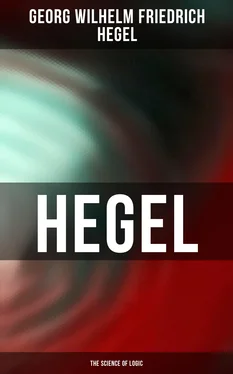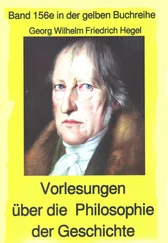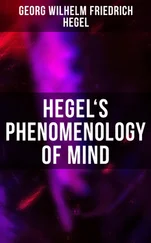Georg Wilhelm Friedrich Hegel - Hegel - The Science of Logic
Здесь есть возможность читать онлайн «Georg Wilhelm Friedrich Hegel - Hegel - The Science of Logic» — ознакомительный отрывок электронной книги совершенно бесплатно, а после прочтения отрывка купить полную версию. В некоторых случаях можно слушать аудио, скачать через торрент в формате fb2 и присутствует краткое содержание. Жанр: unrecognised, на английском языке. Описание произведения, (предисловие) а так же отзывы посетителей доступны на портале библиотеки ЛибКат.
- Название:Hegel: The Science of Logic
- Автор:
- Жанр:
- Год:неизвестен
- ISBN:нет данных
- Рейтинг книги:4 / 5. Голосов: 1
-
Избранное:Добавить в избранное
- Отзывы:
-
Ваша оценка:
- 80
- 1
- 2
- 3
- 4
- 5
Hegel: The Science of Logic: краткое содержание, описание и аннотация
Предлагаем к чтению аннотацию, описание, краткое содержание или предисловие (зависит от того, что написал сам автор книги «Hegel: The Science of Logic»). Если вы не нашли необходимую информацию о книге — напишите в комментариях, мы постараемся отыскать её.
Hegel: The Science of Logic — читать онлайн ознакомительный отрывок
Ниже представлен текст книги, разбитый по страницам. Система сохранения места последней прочитанной страницы, позволяет с удобством читать онлайн бесплатно книгу «Hegel: The Science of Logic», без необходимости каждый раз заново искать на чём Вы остановились. Поставьте закладку, и сможете в любой момент перейти на страницу, на которой закончили чтение.
Интервал:
Закладка:
20.] If we take our prima facie impression of thought, we find on examination first (a) that, in its usual subjective acceptation, thought is one out of many activities or faculties of the mind, co-ordinate with such others as sensation, perception, imagination, desire, volition, and the like. The product of this activity, the form or character peculiar to thought, is the UNIVERSAL, or, in general, the abstract. Thought, regarded as an activity, may be accordingly described as the active universal, and, since the deed, its product, is the universal once more, may be called a self-actualising universal. Thought conceived as a subject (agent) is a thinker, and the subject existing as a thinker is simply denoted by the term 'I.'
The propositions giving an account of thought in this and the following sections are not offered as assertions or opinions of mine on the matter. But in these preliminary chapters any deduction or proof would be impossible, and the statements may be taken as matters in evidence. In other words, every man, when he thinks and considers his thoughts, will discover by the experience of his consciousness that they possess the character of universality as well as the other aspects of thought to be afterwards enumerated. We assume of course that his powers of attention and abstraction have undergone a previous training, enabling him to observe correctly the evidence of his consciousness and his conceptions.
This introductory exposition has already alluded to the distinction between Sense, Conception, and Thought. As the distinction is of capital importance for understanding the nature and kinds of knowledge, it will help to explain matters if we here call attention to it. For the explanation of Sense, the readiest method certainly is, to refer to its external source—the organs of sense. But to name the organ does not help much to explain what is apprehended by it. The real distinction between sense and thought lies in this—that the essential feature of the sensible is individuality, and as the individual (which, reduced to its simplest terms, is the atom) is also a member of a group, sensible existence presents a number of mutually exclusive units,—of units, to speak in more definite and abstract formulae, which exist side by side with, and after, one another. Conception or picture-thinking works with materials from the same sensuous source. But these materials when conceived are expressly characterised as in me and therefore mine: and secondly, as universal, or simple, because only referred to self. Nor is sense the only source of materialised conception. There are conceptions constituted by materials emanating from self-conscious thought, such as those of law, morality, religion, and even of thought itself, and it requires some effort to detect wherein lies the difference between such conceptions and thoughts having the same import. For it is a thought of which such conception is the vehicle, and there is no want of the form of universality, without which no content could be in me, or be a conception at all. Yet here also the peculiarity of conception is, generally speaking, to be sought in the individualism or isolation of its contents. True it is that, for example, law and legal provisions do not exist in a sensible space, mutually excluding one another. Nor as regards time, though they appear to some extent in succession, are their contents themselves conceived as affected by time, or as transient and changeable in it. The fault in conception lies deeper. These ideas, though implicitly possessing the organic unity of mind, stand isolated here and there on the broad ground of conception, with its inward and abstract generality. Thus cut adrift, each is simple, unrelated: Right, Duty, God. Conception in these circumstances either rests satisfied with declaring that Right is Right, God is God: or in a higher grade of culture, it proceeds to enunciate the attributes; as, for instance, God is the Creator of the world, omniscient, almighty, &c. In this way several isolated, simple predicates are strung together: but in spite of the link supplied by their subject, the predicates never get beyond mere contiguity. In this point Conception coincides with Understanding: the only distinction being that the latter introduces relations of universal and particular, of cause and effect, &c., and in this way supplies a necessary connexion to the isolated ideas of conception; which last has left them side by side in its vague mental spaces, connected only by a bare 'and.'
The difference between conception and thought is of special importance: because philosophy may be said to do nothing but transform conceptions into thoughts,—though it works the further transformation of a mere thought into a notion.
Sensible existence has been characterised by the attributes of individuality and mutual exclusion of the members. It is well to remember that these very attributes of sense are thoughts and general terms. It will be shown in the Logic that thought (and the universal) is not a mere opposite of sense: it lets nothing escape it, but, outflanking its other, is at once that other and itself. Now language is the work of thought: and hence all that is expressed in language must be universal. What I only mean or suppose is mine: it belongs to me,—this particular individual. But language expresses nothing but universality; and so I cannot say what I merely mean. And the unutterable,—feeling or sensation,—far from being the highest truth, is the most unimportant and untrue. If I say 'The individual,' 'This individual,' 'here,' 'now,' all these are universal terms. Everything and anything is an individual, a 'this,' and if it be sensible, is here and now. Similarly when I say, 'I,' I mean my single self to the exclusion of all others: but what I say, viz. 'I,' is just every 'I,' which in like manner excludes all others from itself. In an awkward expression which Kant used, he said that I accompany all my conceptions,—sensations, too, desires, actions, &c. 'I' is in essence and act the universal: and such partnership is a form, though an external form, of universality. All other men have it in common with me to be 'I': just as it is common to all my sensations and conceptions to be mine. But 'I,' in the abstract, as such, is the mere act of self-concentration or self-relation, in which we make abstraction from all conception and feeling, from every state of mind and every peculiarity of nature, talent, and experience. To this extent, 'I' is the existence of a wholly abstract universality, a principle of abstract freedom. Hence thought, viewed as a subject, is what is expressed by the word 'I': and since I am at the same time in all my sensations, conceptions, and states of consciousness, thought is everywhere present, and is a category that runs through all these modifications.
Our first impression when we use the term thought is of a subjective activity—one amongst many similar faculties, such as memory, imagination and will. Were thought merely an activity of the subject-mind and treated under that aspect by logic, logic would resemble the other sciences in possessing a well-marked object. It might in that case seem arbitrary to devote a special science to thought, whilst will, imagination and the rest were denied the same privilege. The selection of one faculty however might even in this view be very well grounded on a certain authority acknowledged to belong to thought, and on its claim to be regarded as the true nature of man, in which consists his distinction from the brutes. Nor is it unimportant to study thought even as a subjective energy. A detailed analysis of its nature would exhibit rules and laws, a knowledge of which is derived from experience. A treatment of the laws of thought, from this point of view, used once to form the body of logical science. Of that science Aristotle was the founder. He succeeded in assigning to thought what properly belongs to it. Our thought is extremely concrete: but in its composite contents we must distinguish the part that properly belongs to thought, or to the abstract mode of its action. A subtle spiritual bond, consisting in the agency of thought, is what gives unity to all these contents, and it was this bond, the form as form, that Aristotle noted and described. Up to the present day, the logic of Aristotle continues to be the received system. It has indeed been spun out to greater length, especially by the labours of the medieval Schoolmen who, without making any material additions, merely refined in details. The moderns also have left their mark upon this logic, partly by omitting many points of logical doctrine due to Aristotle and the Schoolmen, and partly by foisting in a quantity of psychological matter. The purport of the science is to become acquainted with the procedure of finite thought: and, if it is adapted to its pre-supposed object, the science is entitled to be styled correct. The study of this formal logic undoubtedly has its uses. It sharpens the wits, as the phrase goes, and teaches us to collect our thoughts and to abstract —whereas in common consciousness we have to deal with sensuous conceptions which cross and perplex one another. Abstraction moreover implies the concentration of the mind on a single point, and thus induces the habit of attending to our inward selves. An acquaintance with the forms of finite thought may be made a means of training the mind for the empirical sciences, since their method is regulated by these forms: and in this sense logic has been designated Instrumental. It is true, we may be still more liberal, and say: Logic is to be studied not for its utility, but for its own sake; the super-excellent is not to be sought for the sake of mere utility. In one sense this is quite correct: but it may be replied that the super-excellent is also the most useful: because it is the all-sustaining principle which, having a subsistence of its own, may therefore serve as the vehicle of special ends which it furthers and secures. And thus, special ends, though they have no right to be set first, are still fostered by the presence of the highest good. Religion, for instance, has an absolute value of its own; yet at the same time other ends flourish and succeed in its train. As Christ says: 'Seek ye first the kingdom of God, and all these things shall be added unto you.' Particular ends can be attained only in the attainment of what absolutely is and exists in its own right.
Читать дальшеИнтервал:
Закладка:
Похожие книги на «Hegel: The Science of Logic»
Представляем Вашему вниманию похожие книги на «Hegel: The Science of Logic» списком для выбора. Мы отобрали схожую по названию и смыслу литературу в надежде предоставить читателям больше вариантов отыскать новые, интересные, ещё непрочитанные произведения.
Обсуждение, отзывы о книге «Hegel: The Science of Logic» и просто собственные мнения читателей. Оставьте ваши комментарии, напишите, что Вы думаете о произведении, его смысле или главных героях. Укажите что конкретно понравилось, а что нет, и почему Вы так считаете.












